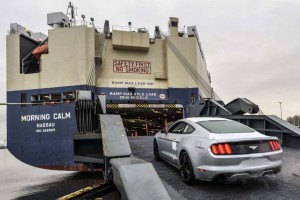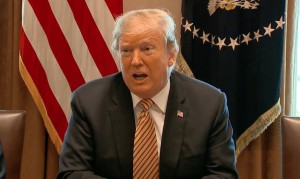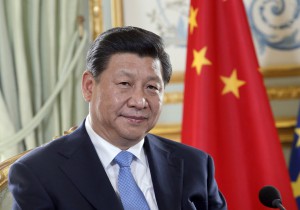
With the stoppage of trade talks between the U.S. and China, this picture's going to be less frequent in the short term.
Trade talks between the U.S. and China seem to have hit another pothole despite hopes for a broad agreement that could satisfy both sides. Car makers worldwide have been hoping for a new deal during the past several months.
Michael Dunne, president of ZoZoGo LLC, an advisory firm specializing in China’s electric and autonomous tech market and long-time student of Chinee industry, said tension are inevitable given the stakes and do leave Detroit’s automakers vulnerable.
“The Chinese are really tough negotiators,” noted Michael Dunne said during an appearance at the Automotive Press Association.
President Donald Trump has succeeded in keeping them off balance, but so far an agreement has eluded negotiators. It’s also clear that the U.S. doesn’t have the leverage it enjoyed 20 years ago when China was eager to import new technology, a point Dunne illustrated with a story from the 1990s involving the “Kit price” between Beijing Jeep and the Chrysler Group.
(California start-up plans to launch $149,000 Chinese-made sports car. Click Here for the story.)
The Beijing Jeep negotiators eventually caved in those talks because Chrysler had the technology.
It’s not clear in the current situation, who has the leverage in the current trade talks, he said. “Certainly, the Chinese are concerned about losing access to the U.S. market,” he said.

President Donald Trump plans to implement a 25% tariff on Chinese goods coming into the U.S. now that talks have broken down.
But at the same time the Chinese and U.S. economies have become so intertwined that disrupting the relationship – even though China has to be considered the United State principal rival for influence and power – would have an adverse impact on some of the U.S. principal companies such Apple, Microsoft and General Motors.
“The U.S. and China have huge business interests on each side,” Dunne said. “That doesn’t get unwound easily,” he added. At the time, though, China has not moved towards opening up its economy or political system as negotiators for Bush and Obama administration once hoped.
“The Communists have become very good at harnessing the energy of Chinese entrepreneurs,” said Dunne, who has studied Chinese business practices for the better part of three decades.
Dunne said the trade talks and the slowdown in the Chinese economy, which cut sales of new vehicles, also exposed the vulnerabilities of Detroit’s three automakers, GM, Ford Motor Co. and Fiat Chrysler in the evolving Chinese market.
GM sales topped 4 million units in 2017 after years of solid growth stretching back to 2009. Ford had built up momentum in China but stumbled badly in 2018 and FCA’s Jeep brand has yet to catch on China, which is now by far the world’s largest automotive market, Dunne noted.
Sales by GM and Ford also declined further in the first quarter of 2019, Dunne noted.
For GM and Ford, the bright spots are the growth of the Cadillac and Lincoln brands both of which appeal to affluent Chinese customers. FCA probably ought to consider re-ordering its Chinese market with additional emphasis on its prestige brands.
(Click Here for more about Ford’s second act in China: Ford China 2.0.)
The vulnerability of Detroit’s manufacturers has been amplified by the defensive posture that has led them to pull out of markets all over the world, Dunne said. “They ought to be more aggressive,” he said.
Meanwhile, German automakers – Mercedes-Benz, BMW and Audi – have tightened their grip on the China’s growing premium market, while Volkswagen is spending billions of euros in a bid to become the leading electric-car company in China.
China’s political leadership, however, is intent on finding to ways to maintain the company’s economic growth. It has launched two sweeping initiatives. One is called “Belt and Road” a trillion dollar in infrastructure projects designed to project China’s influence in across Asia and on into Africa and Europe. Another initiative involves China 2025, which is promoted to make China a leader in several high-tech fields such as artificial intelligence, autonomous vehicles, electric vehicles and robotics.
Chinese will also have a keen interest in acquiring companies such as Pirelli, one of the world’s leading tire manufacturers, and German robotics firm Kuka, a supplier of the robots widely used in car factories around the world.
China is also serious about becoming the absolute leader in electric vehicle technology. It already the world’s leader in EV sales volume, as Chinese consumer purchased 1.2 million electric vehicles last and the volume in expected to grow to 5 million in 2025 and 15 million by 2030.
Chinese battery companies, once laggards, are now closing the gap quickly, said Dunne, who noted that while China’s government has stopped subsidizing EVs, it now expects Chinese companies to offer incentives.
“Beyond that they’re looking at fuel cells,” he said.
Chinese companies, while hobbled by the unfolding trade dispute with the U.S., are eager to set up shop in the U.S. It’s an open question whether if the first entrants will use lower prices to break into the market or it will be a new brand such as NIO or Zoyte that will attempt to build a brand in the U.S. using smart technology and design, Dunne told reporters after his formal remarks.
But the Trump administration stance on trade, which includes slowing the rate of Chinese investment in U.S. companies as they search for new technology, hasn’t halted China’s push as the automobile industry goes through a transformation driven by new technology.
(To see more about Geely getting Smart with Daimler AG, Click Here.)
Chinese companies are actively looking for talent worldwide to help them achieve their countries goals. Of the 50 companies test autonomous vehicles in California, 13 of them are from China.

